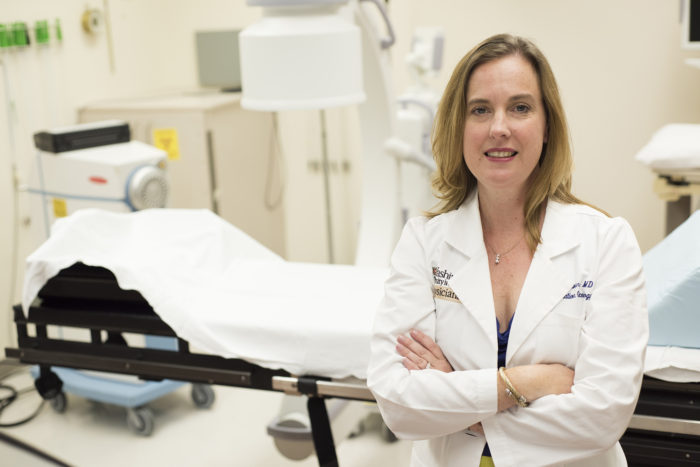Director of Cancer Biology Division named
From research to patient care, Schwarz seeks to deliver optimal radiation therapy
 Robert Boston
Robert BostonJulie K. Schwarz, MD, PhD, has been named director of the Cancer Biology Division in the Department of Radiation Oncology at Washington University School of Medicine in St. Louis.
Julie K. Schwarz, MD, PhD, an associate professor of radiation oncology, has been named director of the Cancer Biology Division in the Department of Radiation Oncology at Washington University School of Medicine in St. Louis.
Schwarz is a leading physician-scientist focused on understanding the biology of cervical cancer. In an effort to provide the best possible care for her patients, she studies cervical tumor metabolism, radiographic imaging of those tumors and ways to use radiation and chemotherapy to attack these types of cancer cells.
“Dr. Schwarz is a superb research scientist and an excellent physician, leading the way in working to better understand cervical cancer, so that more effective treatments can be brought to the clinic,” said Dennis E. Hallahan, MD, the Elizabeth H. and James S. McDonnell III Distinguished Professor of Medicine and head of the Department of Radiation Oncology. “Her strengths, talents and expertise were precisely what we were looking for in leadership for the Cancer Biology Division.”
Washington University is a national leader in radiation oncology, developing standard protocols and quality-assessment tools used by radiation therapy centers across the country. Schwarz said she and her colleagues in the division are particularly interested in pursuing research into new ways to combine radiation therapy with the latest tools and strategies being harnessed against cancer, including immunotherapy, tumor metabolism and bioinformatics.
“It is my great pleasure to work with the outstanding faculty in the department and to seek new ways to collaborate with our esteemed colleagues in the wider research community at Washington University,” said Schwarz, who sees patients at Siteman Cancer Center at Barnes-Jewish Hospital and Washington University School of Medicine.
“We have tremendous resources in our department, including tissue banks with tumor samples and blood samples, clinical data from the patients who gave those samples, and radiographic images of their tumors,” she added. “The potential to put all these big data resources together and ask fundamental questions about radiation therapy efficacy — including how it may be combined with the latest chemotherapies, immunotherapies or metabolic therapies against tumors — is a really exciting opportunity.”
After earning a bachelor’s degree in biology from Duke University in 1995, Schwarz came to Washington University, where she joined the Medical Scientist Training Program. She earned a medical degree and a doctorate in cell and molecular biology in 2004. Schwarz continued her training with an internship and residency at Washington University and Barnes-Jewish Hospital.
Schwarz joined the faculty in 2009. Her laboratory research is supported by grants from the National Institutes of Health (NIH) and the Radiological Society of North America.






